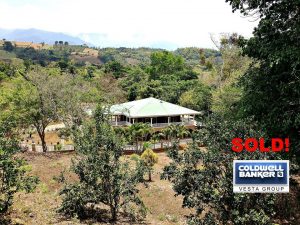Valuation is an art, not a science. That rings especially true in Costa Rica.
Before I ended up as a Costa Rica real estate agent…well, even going a bit further back than that…I was a business valuation consultant, as well as M&A dealmaker. I still remember a thing or two about valuing operating businesses. Granted, I never got into valuing real estate, which is another animal, if not completely all-together…
There are similarities. You generally value a property, be it an operating business or a real estate asset, based on its income, its replacement cost, on actual sales of comparable assets, or some weighted combination of those three methodologies. However, when it comes to Costa Rica real estate pricing, all three tend to break down, with the last one, valuation based on comparable sales, only recently becoming a bit more reliable.
Income-based valuations require reliable financial data. Such data is rarely available in Costa Rica. Owners of properties in Costa Rica just don’t have the “anal retentive” qualities that lend towards generating good hard data one can rely on. Remember this is the land of laid-back and pura vida! No one really pays income taxes down here, so tax returns are completely unreliable. The accounting profession down here is not up to the standards of either the U.S., or Canada. You can pretty much walk into any accountant’s office and get them to “certify” anything you ask them to. Now, if one is adept at evaluating a property based on discounting projected income, then that’s one way to do it. However, most aren’t and of course projections are what they are. The rarely tend to come through to fruition, especially in Costa Rica.
The replacement method is what many property owners want would-be buyers to focus on. I don’t know how many times I’ve heard the complaint that the price offered is not nearly what the owner has put into the property. Well, the problem is that a property is not necessarily worth what an owner invested in it…it’s worth what the market will pay at a given point in time. And it’s very easy to over-invest in Costa Rica. Property owners often get a bit ahead of themselves with their ideas and end up building something that no one would want to buy at anywhere near the price the owner put into it. Then when someone does come along offering a highly discounted price, you get the aforementioned complaint. It’s just not a reliable way to look at value down here, generally.
Finally you have comparable sales. Nowadays, our informal MLS has developed to the point where there actually is hard data on past sales. The problem is that this data is invisible to would-be buyers. The ones who possess that information are the real estate agents. And that is one reason among many why having a good real estate agent to help you in your property sale or purchase is a very good idea in Costa Rica. I know that sounds self-serving, coming from an agent. But it’s true.
I went out the other day to look at a couple of properties owned by a Costa Rican couple now living in the U.S. Both were nice properties. One was a commercial building and the other a very nice home. I wanted to list them. However, once I heard the prices they were willing to list them at, I backed off. I am not going to waste my time listing something at a price that no one in his or her right mind would pay for a property. So, why do some owners grossly over-price their properties? Well, partly because of their focus on “replacement” value and partly because of a lack of good information.
If you come here with a firm budget in mind, don’t be shy to look at properties north of that budget. There’s a good chance that there’s plenty of give in those prices. You might be able to buy a property priced at, say, $500,000 for $400,000, which would be a 20% discount! I know that’s pretty much unheard of up north, but down here it’s really not that uncommon. By the same token it’s best not to come to Costa Rica with the idea of “stealing” a property either. The frontier days when gringos would come down and buy huge farms for pennies on the dollar from clueless Costa Ricans is over. In fact, it’s beginning to go the other way now. I’ve noticed that Costa Ricans are the ones who tend to grossly overprice their properties, hoping to cash in on the foreign investment wave that has swept the country in the last decade.
I should say something about the lingering effects of the 2008 crash. Yes, that world-wide economic event did have its effect in Costa Rica. Before it happened the speculative bubble had inflated to unreasonable proportions, especially in hot areas like the “gold coast” of Guanacaste. That bubble did burst, but a decade later it’s gradually beginning to inflate again. I would describe the current market, at least the one I operate in, the Southern Zone, as in transition from buyers’ to sellers’ market. There are some areas where prices are already on the rise. Those are popular beach areas like Ojochal. In the mountains, less then an hour from the coast, the market has been slower to rebound.
The Costa Rica real estate market may no longer be the “frontier” that it was back in the good ole days of not so long ago. However, it’s still one in which pricing is certainly more of an art than a science.
This post probably has not met the challenge of its title in terms of “unraveling” Costa Rica real estate pricing. But I hope it has at least served to clear up the muddy waters and give you a bit more visibility.

